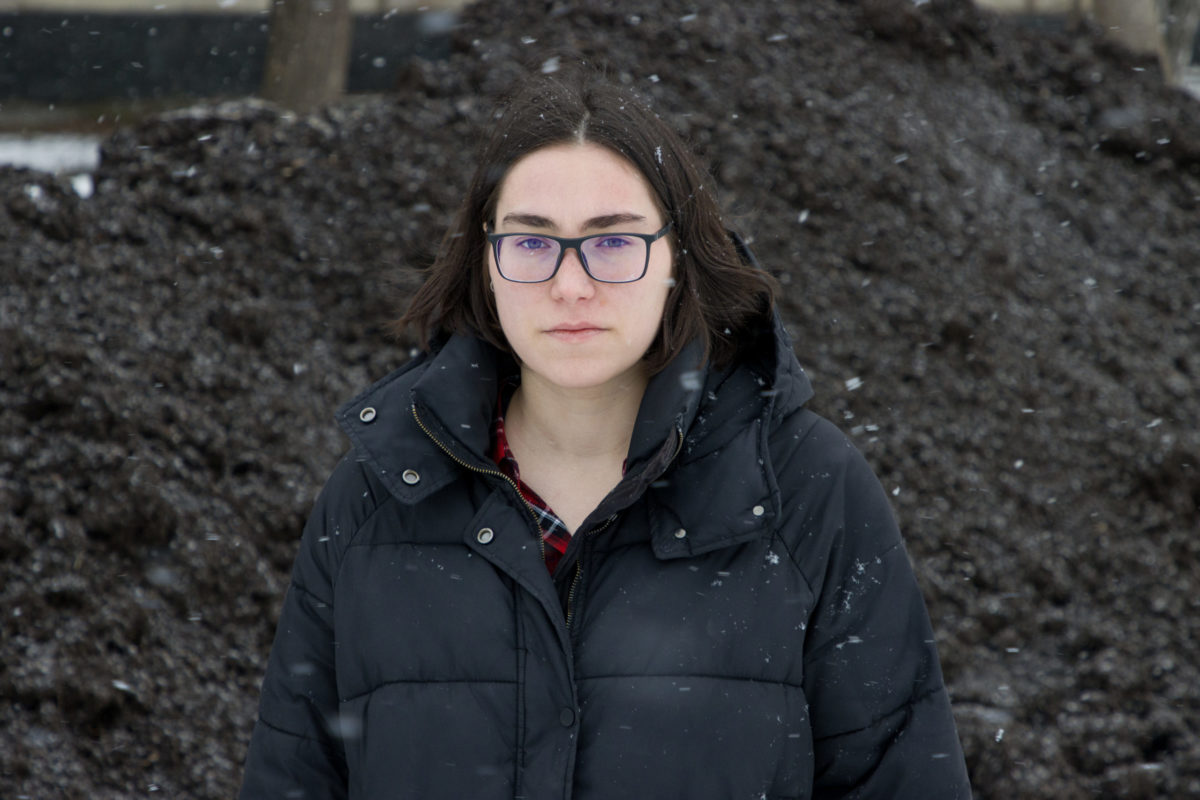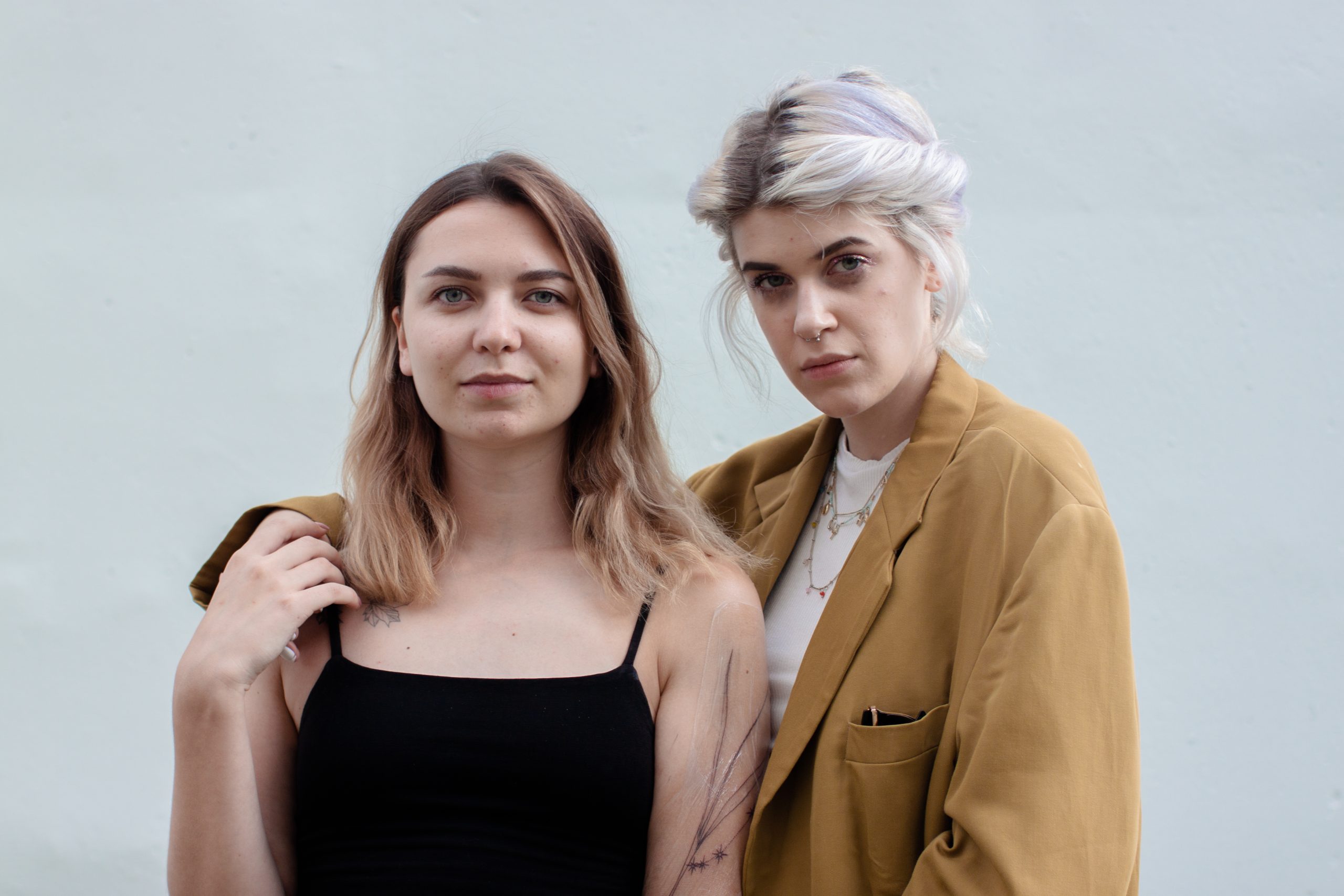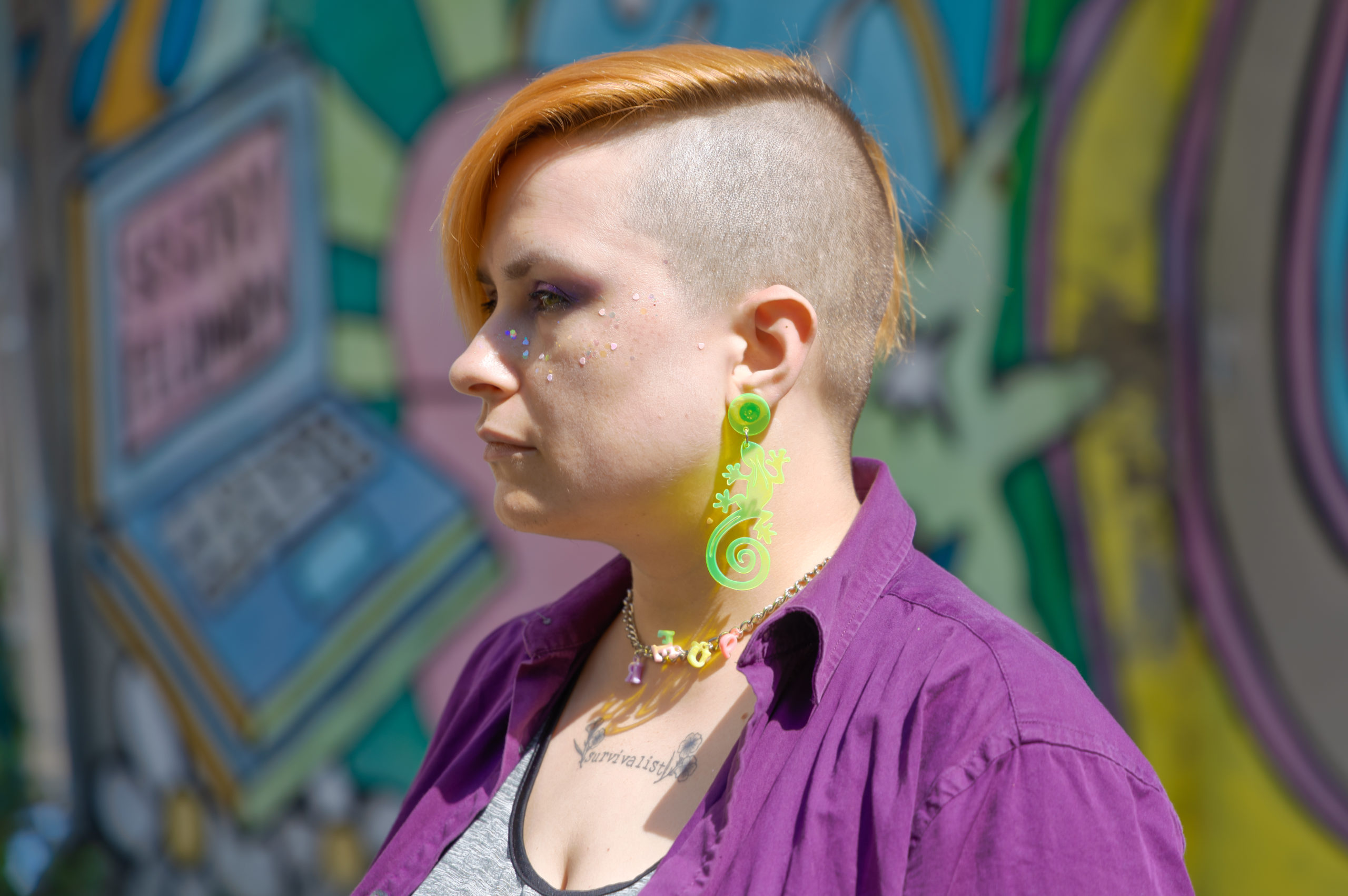Brie (FemSolution)
3 December 2023
Editor: Bozhena Makovska
Translators: Bozhena Makovska, Maryna Isaieva
Photographer: Michael Tulsky
FemSolution is a horizontal, intersectional feminist initiative that is currently engaged in helping IDP women, assisting victims of russian aggression from the de-occupied territories, and implementing educational projects. You can support them using these requisites.
My activism began with the trade union. While still at school, I started to identify as an anarchist. I kept up with various left-wing initiatives in Ukraine and beyond. At the age of 15, I attended a meeting of Direct Action, an organisation that originated in Ukraine in the 90s. Direct Action protects students’ rights, supports youth initiatives, and serves as a platform for them. We had weekly lectures, including ones on queer theory and feminism, and it was there that I gained most of the knowledge that I possess today. I remained actively involved in the organisation’s activities until 2019. We worked on educational projects and organised several festivals, and it was great fun. However, given that our work primarily focused on students, I lacked feminist activism.
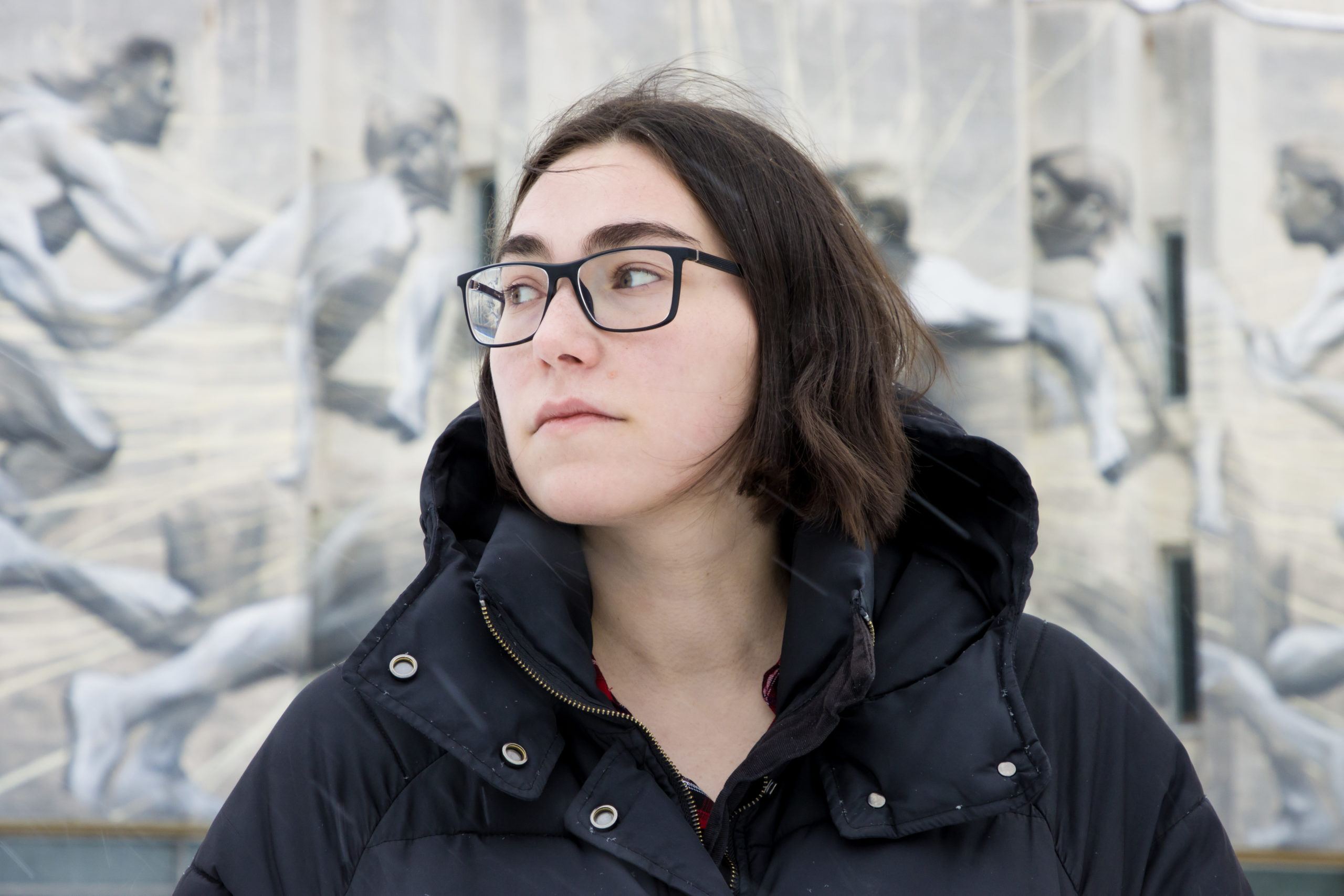
In 2016, after the March 8th rally, I joined the newly created organisation FemSolution at the Kyiv-Mohyla Academy.
FemSolution mostly held lectures, discussions, and readings. We had a space where we also held meetings for activists and people who were sympathetic to us. Now I understand that this was our practice of self-care and it was very supportive for activists. We were just starting to explore feminism, and many of our colleagues were studying at the sociology faculty, so they could “bring” something from there and tell us about it. Learning about how this world is structured was very informative, but at the same time painful.
We always liked the idea of creating zines, and we attended various workshops on the topic. Eventually, we decided to print our zine. We called it “La Merde” because we left stacks of them on the windowsill in the toilet to attract as many students as possible.
Inside, there was both poetry and art; we accepted any works that the authors considered feminist. During the pandemic, we also made a zine and paid the authors, but it was never released. The pandemic was a difficult time for our initiative, we hardly saw each other. I didn’t leave my house for almost three months because my mother had cancer. Now, we still want to publish that zine online.
In parallel, we are preparing two new zines. They will be thematic, it’s a new concept for us. The first zine — blackout — will contain reflections of people on their lives during power outages in the city. The second zine — the wartime zine — will be a space for different experiences of living through war. We hope that this (shared) experience will help us attract more people to the feminist community. I also see this as an opportunity to reflect reality: people are drawing now, writing texts, and poems, and it is important.
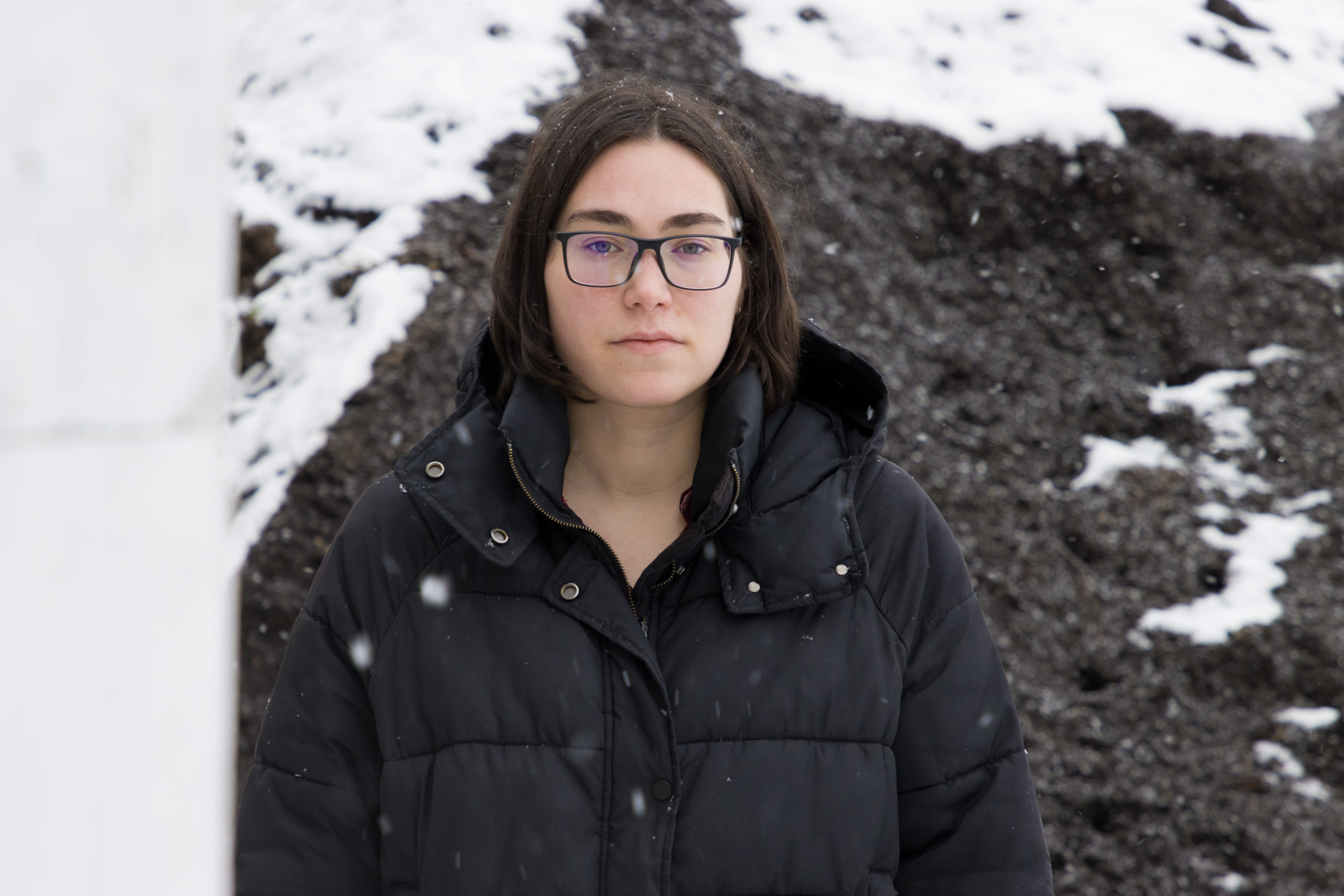
In 2017, due to repression from the university administration, we, as an organisation, had to leave the university. The story began when a girl approached us, saying that she was being harassed by her law professor. We talked to other female law students and found out that this was not the first such case. Even on this professor’s Facebook page, there were public statements that could be identified as harassment; we printed them out and posted them around the university. After that, we decided to organise a protest.
I already had experience organising protests, so I sent out press releases to create resonance and achieve success — the dismissal of the lecturer. However, almost all media outlets refused me, and only our acquaintances came to cover the event. Additionally, far-right groups came to the rally because the lecturer spread fake information that he was supposedly being dismissed because he promotes and defends the Ukrainian language. These guys harassed the participants, grabbed their backpacks, and shouted insults. We had to interrupt the rally for safety reasons, but we finally held it the next day. By then, many more students had gathered because everyone learned that 30 titushkas had invaded the university grounds the day before and attacked peaceful protesters.
After the action, our activists were summoned to the dean’s office to exert pressure. Grown men would come to our events and jot something down so that they could report it somewhere later. Most of the participants in our organisation were studying for a master’s degree at the time, and we wanted to protect them, so we ceased our activities at the university.
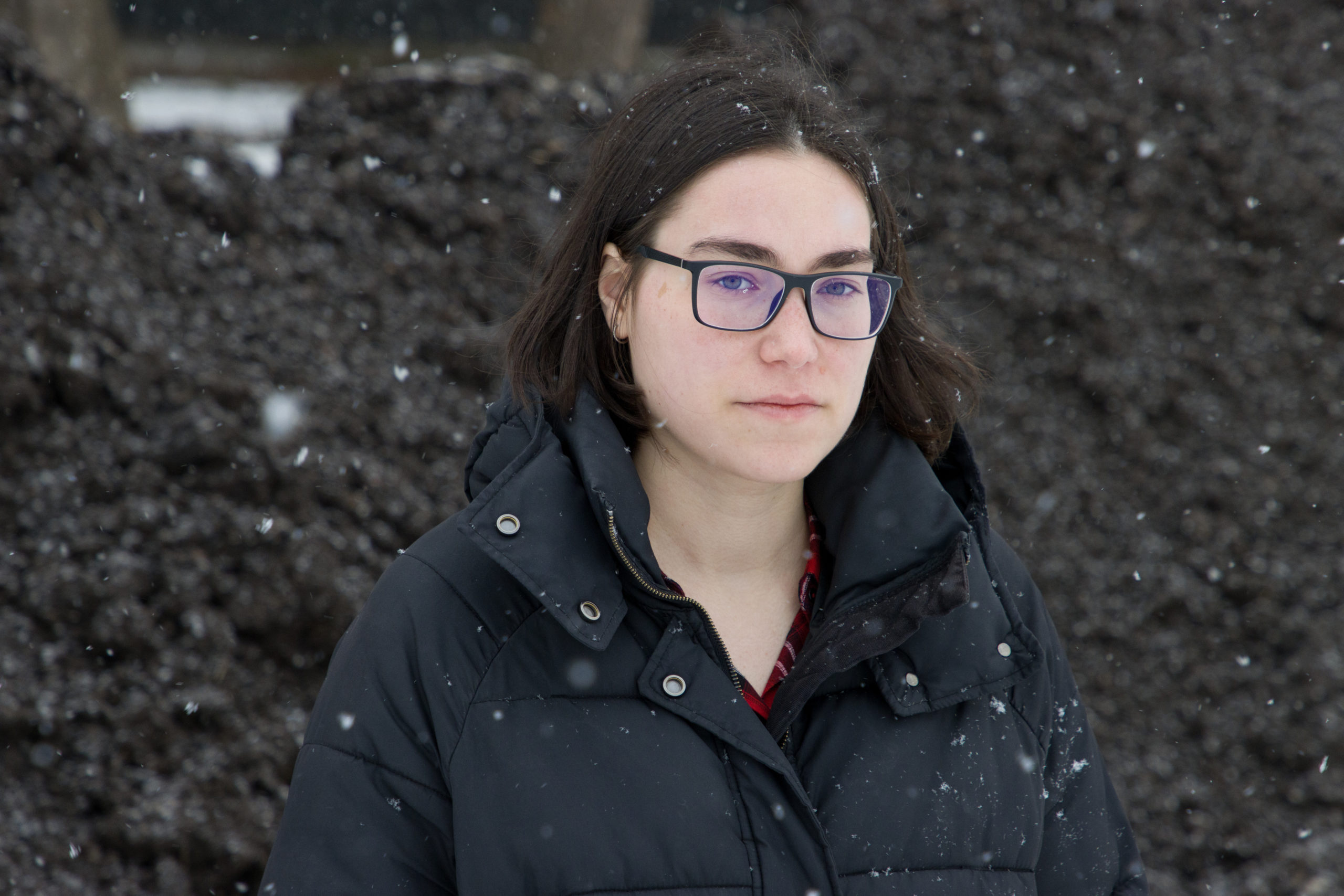
From that point on until the full-scale russian invasion, we organised various protests, including the “I’m Not Afraid to Act” march dedicated to the MeToo movement. We were co-organisers of feminist camps and different educational events; we like to identify FemSolution precisely as an educational initiative.
Since February 24, 2022, we have been engaged in humanitarian work. We process many individual requests for assistance and provide it whenever possible. Immediately after this interview, I will go to pack humanitarian aid for Kherson. Our packages contain hygiene products, medicines that we buy on prescription, and sometimes clothing. We currently have a large base of internally displaced women, as well as those who have lost their jobs or have been affected by the war in other ways. We have significantly increased the number of followers on social media, and this motivates us to continue our educational activities. We have already started making posts about feminism, violence, and other topics, and we have seen that there is a demand for this. Now we plan to hold meetings for IDPs in Kyiv, including sessions for psychological support.
The initiative currently has 8 active participants, and there are also 4-5 volunteers, primarily helping us collect and package parcels. Yulia leads the humanitarian direction, and everyone else supports her. Three people are currently located abroad, doing what they can to assist, such as inputting recipient data into mailing lists online. All our other activists have already returned to Kyiv. Recently, we rented an office that primarily serves as a warehouse. This space has been extremely helpful, and in the future, we hope to have our own dedicated space for hosting events.
Activists of FemSolution do not receive salaries, and all the aid we receive is spent on humanitarian aid.
We have one grant that goes exclusively to humanitarian aid. We apply wherever we can, but no matter how many grants we receive now, we will still not cover people’s requests for help. People share their stories with us, and as we read them, we realise that the need for assistance is only growing and will continue to do so. When the Ukrainian armed forces liberated the Kharkiv region, we sent aid there, and people there had no access to basic hygiene products at all.
I believe that we are doing the best we can given the number of activists, but some of us refuse to accept this and try to work even harder. Our friends have organised events in our support in Finland, Germany, and other places. I urge people to continue doing this, as we constantly require donations.
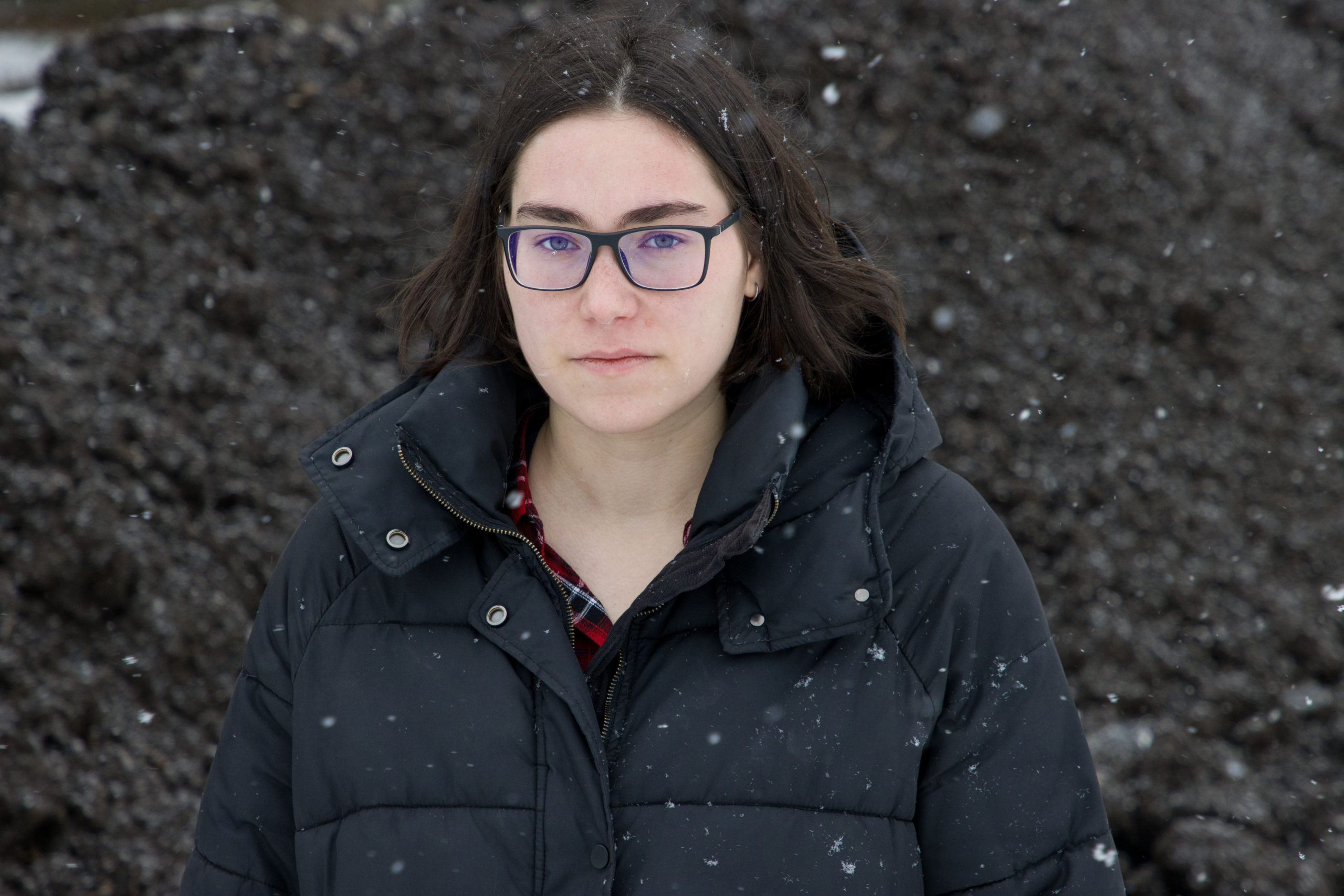
In FemSolution, I am responsible for grants, but I also work at my main job, help Kryvyi Rih miners, and develop my project — the Left Horizons summer school.
Left Horizons is an opportunity for people who care about social change to come together and talk about things that are important to them, as well as look at them from the perspective of feminism, ecology, and so on. I have been to various activist schools, camps, and lectures, and I tried to take the best from them.
The concept of the school is that the participants themselves suggest the content of the program and then choose from the schedule where they want to go that day. No one is obliged to attend all the lectures and there is no need to because all the activities are independent of each other. Communication also takes place on an equal footing: I encourage participants, if they are experts on certain topics, to share this information with others. In the first year, some people indicated in their applications topics that they did not understand but were interested in. They were able to analyse these topics on their own and explain them to others in an accessible way. In the end, everyone liked this format, so we repeated it at the next school. If people have a request to listen to lectures, but there are no experts on these topics among the participants, then I invite lecturers.
This year’s school will be announced on the project’s Instagram.
I really like the Finnish education system. I recently traveled to Finland and had the opportunity to see how it works there. I realised that I intuitively made the school based on the same principles, but there is still something to improve. The school brought together many people with very different backgrounds. For example, we had a woman who works as an accountant in a trade union, a girl from the debate community, and people who create video games… It’s cool and I’m proud of this project.
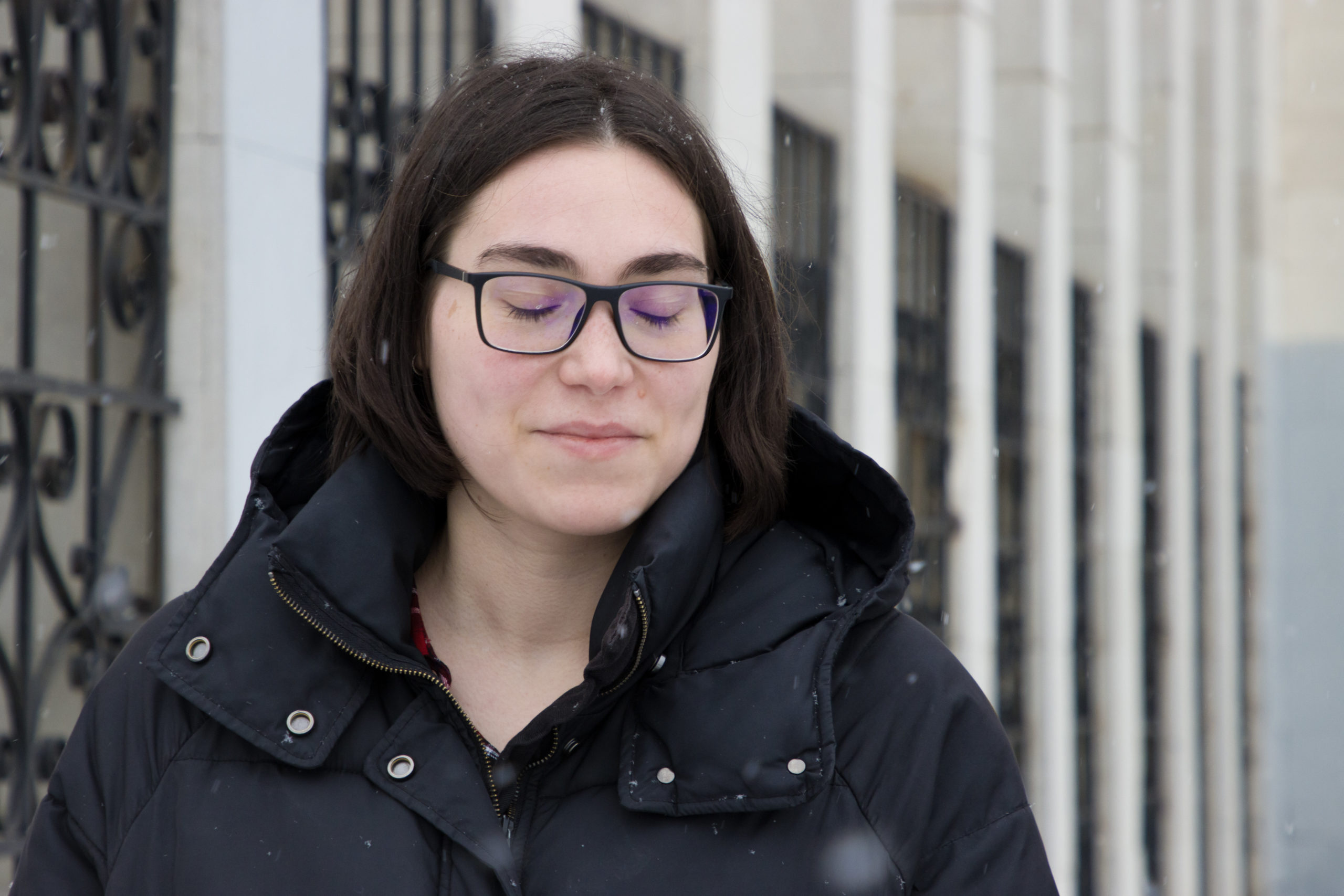
I’m a huge stand-up comedy fan. My friend from the Feminist Lodge and I share this passion and started organising screenings with discussions even before the pandemic hit. It’s fascinating to observe the evolution of this genre and to reflect on the various jokes made by women, including those that are sometimes sexist. In February, just before the full-scale invasion, my favourite stand-up show was released, and we got together with other feminist activists to watch it. Some people couldn’t attend the event due to anxiety.
We all had a feeling that something was about to happen.
At that time, I was already in a volunteer group chat room discussing an action plan, and everyone thought it was inevitable that russia would start a full-scale war against us. But to be honest, when it all started, I was in a stupor. I realised that I couldn’t get to their headquarters and do anything. Very quickly I became a person who communicated with foreigners. But I had enough strength for only two weeks of such work because it was very difficult.
I didn’t want to leave Kyiv, but I relocated to another neighbourhood as I used to live close to the Ministry of Defence. The area without military facilities where I moved to was eventually shelled by the russians, although there is little talk about it. I was worried that the shelling would lead to power cuts, so I had to trek up to the seventh floor on foot. It was hard both for me and my elderly dog. We could constantly hear explosions as the air defence system was operational. It was a huge source of stress for us. I would only go outside for two or three minutes to walk the dog near the house while my brother held the door.
During air raids, we sought refuge in shelters, and I am grateful to those who allowed us in and reacted normally to a person with a large dog. After I left Kyiv, the kindergarten where we usually took shelter came under fire.
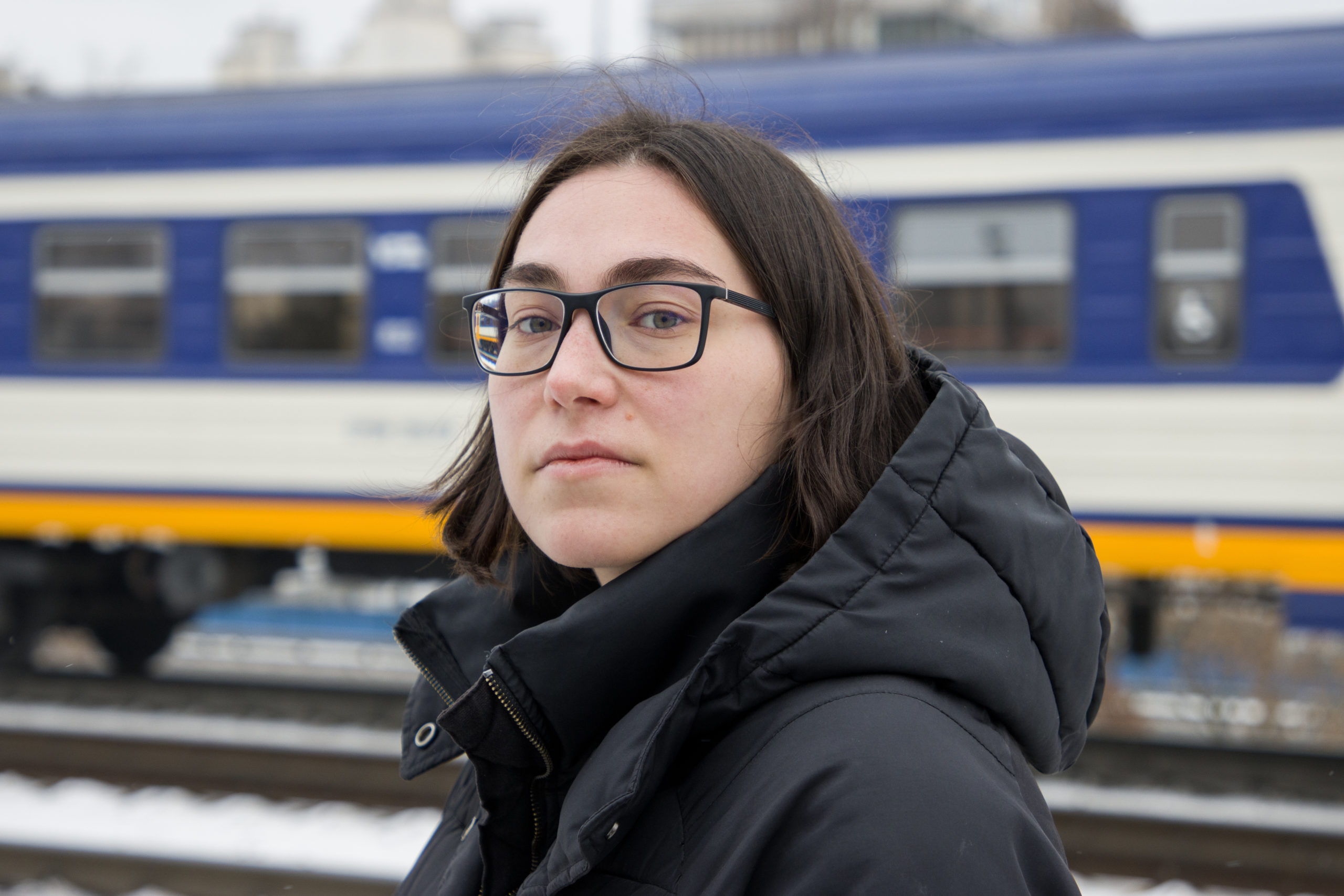
My mom and I decided to leave the city when we finally managed to fill up the car. We were at the petrol station when the air raid alarm went off, and we had to wait for it to reopen. Suddenly, we heard a loud explosion and felt a shock wave from a shell that hit somewhere nearby. It was terrifying not being able to see anything and not knowing if the next shell would hit us. I turned to my mom and told her I couldn’t live here anymore, and the next day we left Kyiv.
The road was very difficult and took about 30 hours. On the way, in Vinnytsia, strangers kindly offered us a place to stay and also treated the dog very well. Later we reached the Lviv region and settled in Stryi. Life there was calm, almost nothing happened. We were lucky to find a place to live that didn’t cost much. I did not know if I would have a job, it was not clear what would happen next. After living in Stryi for seven months, I returned to Kyiv in October.
Kyiv is my hometown, but I never envisioned living here during the war.
The first two weeks after my return were incredibly challenging, but things have improved since then, and I’m not as worried as before. It seems to me that I have already gotten used to the shelling and accepted the situation as a whole. I feel that everything will be fine.
It’s a little sad that there is such a stagnation with activism here now. FemSolution and I are going to try to revive the community. On March 8, in collaboration with the Feminist Lodge, we’re organising a charity event where feminist musicians of various genres will perform. Additionally, there will be a tattoo corner, a lottery, and vegan cuisine. All proceeds from the event will be donated to the 93rd Brigade, where our comrades are serving. They are currently on a mission in the Bakhmut direction; they need to repair vehicles and are in great need of drones.
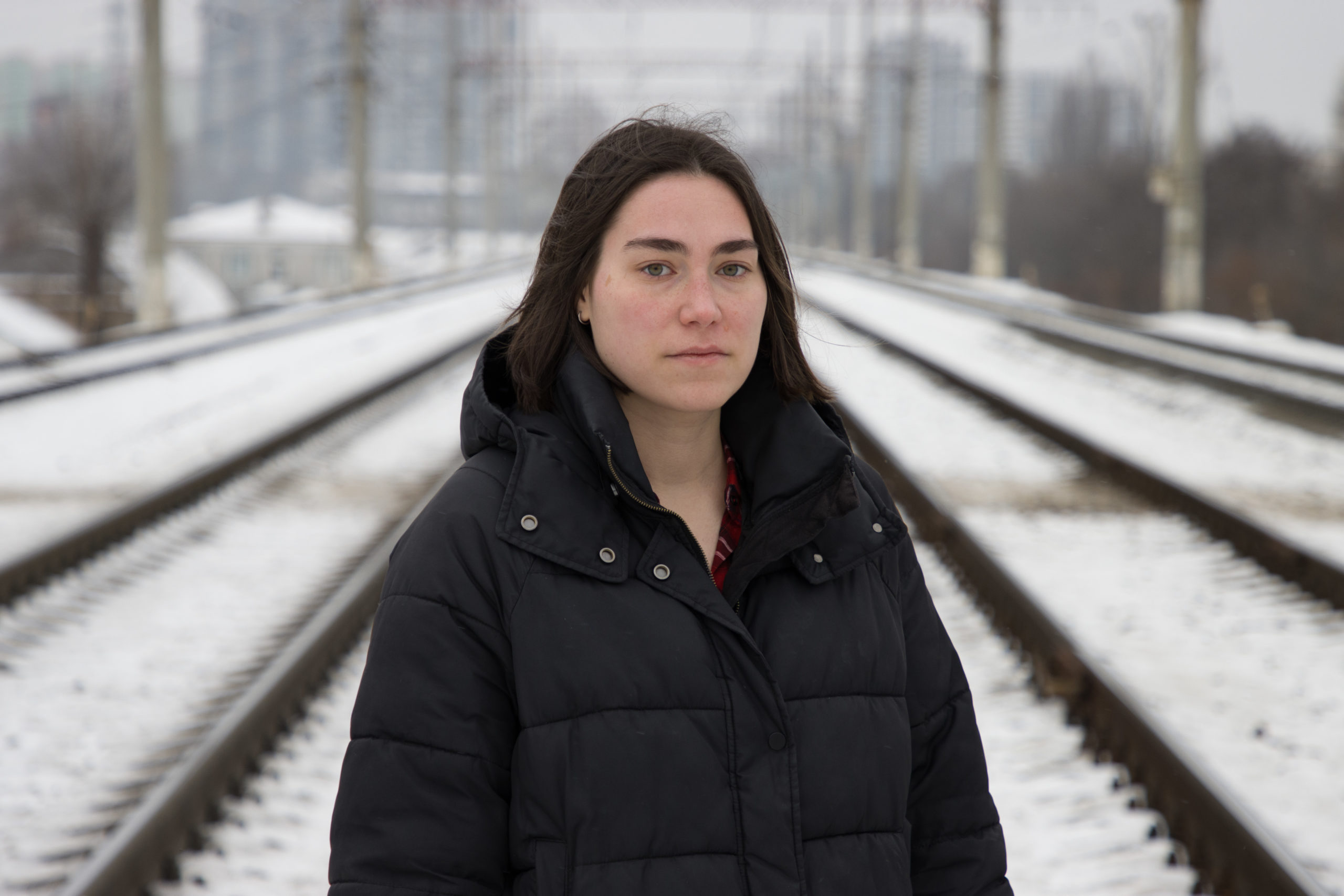
It is important for me to highlight the need to support Ukraine with weapons.
It’s strange to hear discussions suggesting that anti-militarism necessitates withholding armed assistance from Ukraine. While I generally support the notion that there should be no weapons in principle, as someone with anti-militarist sentiments, we cannot advocate for this while russians are killing our military and civilians.
I am also frustrated by the topic of negotiations. There are often Western opinions that Ukrainians simply do not want to sit down and talk. I believe that this format of resolving the situation is currently impossible. There were negotiations at the beginning of the full-scale offensive, but during these negotiations, russia was shelling our cities, so what kind of negotiations are we talking about?
We need weapons to defend our people, the civilian population. If you want us all to be killed, then yes, we don’t need weapons for that. Ukraine is now fighting for the war to end, and we have no other way but to deter russian aggression.
Feminists of Kyiv is operated by a team of volunteers. We would like to produce more English-language interviews with feminists, LGBTQ+ activists, and other Ukrainian change-makers. You can support us with a one-time donation via PayPal (femkyiv@proton.me) or on Patreon.
